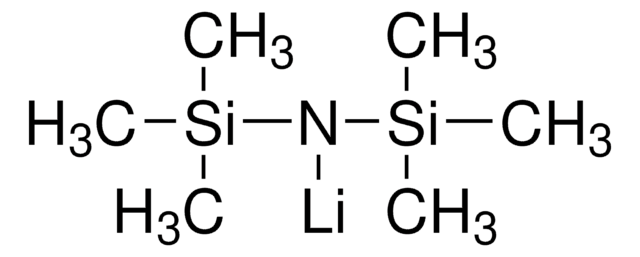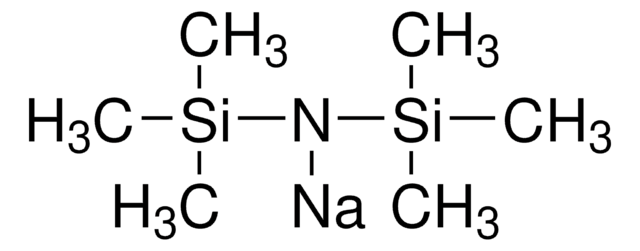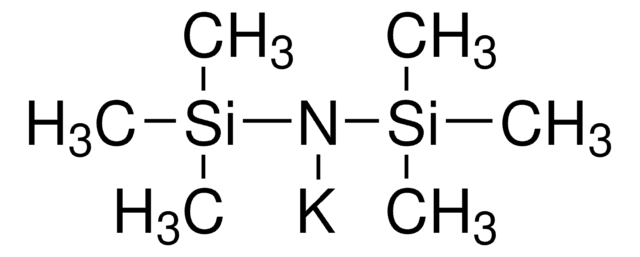920398
Lithium bis(trimethylsilyl)amide
99.9% trace metals basis
Synonyme(s) :
LHMDS, LiHMDS, LiTMSA, Lithium hexamethyldisilazide, Hexamethyldisilazane lithium salt
About This Item
Produits recommandés
Niveau de qualité
Pureté
99.9% trace metals basis
Forme
solid
Densité
0.860 g/mL at 25 °C (lit.)
Application(s)
battery manufacturing
Chaîne SMILES
[Li]N([Si](C)(C)C)[Si](C)(C)C
InChI
1S/C6H18NSi2.Li/c1-8(2,3)7-9(4,5)6;/h1-6H3;/q-1;+1
Clé InChI
YNESATAKKCNGOF-UHFFFAOYSA-N
Vous recherchez des produits similaires ? Visite Guide de comparaison des produits
Description générale
Application
- As an electrolyte additive for non-aqueous lithium metal batteries. LiHMDS acts as a scavenger for hydrofluoric acid and forms an electrochemical robust cathode|electrolyte interphase (CEI) and suppresses the side reactions with the electrolyte solution.
- As a lithium precursor for atomic layer deposition(ALD) of textured Li4Ti5O12 as anode material for Li-ion ultrafast charging thin-film batteries. It enables the controlled delivery of lithium atoms into the deposition process, leading to the growth of thin films with precise thickness and composition.
- As a precursor to fabricate in situ lithiated quinone cathode as high-capacity organic electrode material for all-solid-state thin-film battery setup.
Mention d'avertissement
Danger
Mentions de danger
Conseils de prudence
Classification des risques
Eye Dam. 1 - Flam. Sol. 1 - Self-heat. 1 - Skin Corr. 1B
Risques supp
Code de la classe de stockage
4.2 - Pyrophoric and self-heating hazardous materials
Classe de danger pour l'eau (WGK)
WGK 2
Point d'éclair (°F)
62.6 °F - closed cup
Point d'éclair (°C)
17 °C - closed cup
Faites votre choix parmi les versions les plus récentes :
Certificats d'analyse (COA)
Vous ne trouvez pas la bonne version ?
Si vous avez besoin d'une version particulière, vous pouvez rechercher un certificat spécifique par le numéro de lot.
Déjà en possession de ce produit ?
Retrouvez la documentation relative aux produits que vous avez récemment achetés dans la Bibliothèque de documents.
Notre équipe de scientifiques dispose d'une expérience dans tous les secteurs de la recherche, notamment en sciences de la vie, science des matériaux, synthèse chimique, chromatographie, analyse et dans de nombreux autres domaines..
Contacter notre Service technique




